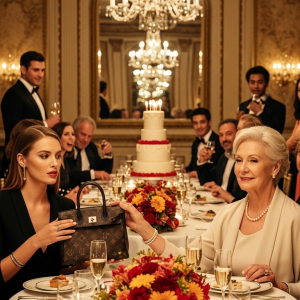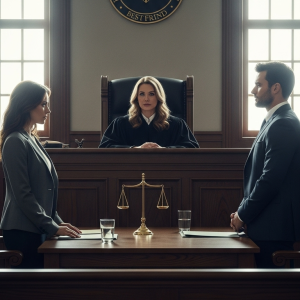The scent of roasted chicken and rosemary filled the small dining room, a stark contrast to the bitter chill of the conversation. Ten years ago, the family dinner was meant to be a celebration of sorts. Emily, at twenty-eight, had finally made a life-altering decision.
Her brother, Mark, a man who measured success in stock prices and square footage, swirled the cheap red wine in his glass. “Let me get this straight. You’re voluntarily taking on a stray? Some random kid the system couldn’t place?”
“He’s not a ‘stray,’ Mark. He’s a little boy. His name is Leo,” Emily said, her voice tight but steady. She clutched her fork, the cold metal a small anchor in the storm of their judgment.
Her sister, Sarah, who had married into money and wore it like a second skin, sighed dramatically. “Emily, be realistic. You’re a first-grade teacher, not a saint. Do you have any idea what this will do to your life? Your finances? Your future? No man wants to take on someone else’s… baggage.”
“He’s not baggage!” Emily’s voice rose, a rare event. “He’s a child who needs a home. A loving one. Something I can give him.”
“It’s a noble sentiment, little sister. A foolish, naive, and incredibly expensive sentiment,” Mark scoffed, cutting into his chicken with surgical precision. “We’re just thinking of you. This ‘Leo’ will be a weight around your neck for the rest of your life. A burden you’re choosing to carry.”
Emily looked from her brother’s condescending smirk to her sister’s pitying gaze. They saw a problem to be managed, a liability on a balance sheet. She saw a chance to give and receive a love that was pure and unconditional.
“He won’t be a burden,” she said, her words a quiet vow to the empty chair at her table, a chair she already pictured a small boy occupying. “He will be my son.”
The laughter that followed was soft, but it cut her deeper than any shout. It was the laughter of people who believed they knew better, who saw her love as a weakness and her choice as a failure. That night, Emily went home, cried for ten minutes, and then began painting the spare room in hues of sunshine yellow and sky blue.
Ten years later, the small, rented house was a kingdom built on love and library books. The scent of old paper and baking cookies had replaced the sterile newness. Life wasn’t easy; it was a patchwork of paychecks, tutoring side-jobs, and carefully managed budgets.
Leo, now a bright, whip-smart ten-year-old, sat at the kitchen table, his brow furrowed in concentration over a complex math problem meant for a high schooler. He had always been different. It wasn’t just his startling intelligence, but a strange, innate grace he possessed.
He moved with a quiet confidence, spoke with a preciseness that was beyond his years, and sometimes, in the dead of night, he would wake from a dream, whispering of a place he couldn’t quite remember.
“There were tall windows,” he’d told Emily once, his eyes clouded with the fog of a fading memory. “And so many rooms. A lady used to bring me milk in a glass that felt cold.” Emily would just hold him, stroking his hair, assuming they were fragments of a life before she found him, a life too painful to fully recall.
Her family, as predicted, had drifted away. Holiday cards became sporadic texts, which then faded into silence. They were embarrassed by her life, by the brilliant, adopted boy from nowhere who was her entire world. They never visited, never asked about him.
Their disapproval was a constant, low hum in the background of her life. When Emily told Sarah she was working nights tutoring to afford Leo’s place in an advanced science program, her sister’s reply was a text: “More money wasted on that kid. You should be saving.”
But Emily saw it as an investment in a beautiful mind. She saw the way his eyes lit up when he solved a puzzle, the pride in his small shoulders when he brought home another perfect test score. Her sacrifice was her joy.
It was one of these achievements that changed everything. A small, specialized education journal ran a feature on a national youth mathematics Olympiad. On page fourteen, there was a picture of a beaming ten-year-old boy, holding a first-place trophy. His name was listed below: Leo Miller, a student of Ms. Emily Miller.
Emily had framed the article. She had no idea it was a beacon, a signal flare cutting through a decade of darkness, sending a shockwave across the country to a world she couldn’t possibly imagine.
The afternoon sun was casting long shadows across the quiet suburban street when the world tilted. It began with a low rumble, the sound of powerful engines where only minivans and sedans usually roamed.
Three black Cadillac Escalades, polished to a mirror shine, glided to a halt in front of Emily’s modest home. They were impossibly large, impossibly sleek, like panthers in a field of sparrows. Neighbors peered through their curtains, phones held up to capture the silent, imposing spectacle.
Emily was in the garden, watering her tomato plants with Leo, when the car doors opened in perfect unison. Three men in dark, impeccably tailored suits emerged. But it was the fourth figure who commanded attention. An older gentleman, his hair silver and his posture ramrod straight, stepped out of the lead vehicle. He held a leather briefcase and his eyes, sharp and intelligent, scanned the small house with an unreadable expression.
He walked up the cracked concrete path, his expensive leather shoes making no sound on the pavement. He stopped before Emily, who stood frozen, the watering can still in her hand. Leo instinctively moved slightly behind her, his small hand gripping the back of her shirt.
“Ms. Emily Miller?” the man asked. His voice was deep, resonant, and carried an authority that made the air feel heavy.
“Yes? Can I help you?” Emily’s voice was a nervous whisper. She thought of unpaid bills, of some terrible mistake, her mind racing through a thousand worst-case scenarios.
The man’s gaze softened for a fraction of a second as it landed on Leo. It was a look of profound, soul-shaking relief, an expression that held a decade of searching within it.
“My name is Arthur Abernathy,” he said, his eyes returning to Emily. “I am an attorney representing the Sterling family. We have been looking for your son for a very long time. May we come inside? We have matters of incredible importance to discuss.”

The name meant nothing to her. But the look in his eyes told her this was no mistake. This was the end of her world as she knew it.
The living room, usually a cozy space of warmth and comfort, felt small and suffocating. Mr. Abernathy sat in the worn-out armchair, his briefcase resting on his knees. Emily and Leo sat opposite him on the couch, a silent team facing the unknown.
Mr. Abernathy opened his briefcase with a quiet click. “Ms. Miller… Emily. What I am about to tell you will be difficult to process. Please, bear with me.”
He paused, his gaze fixed on the boy beside her. “Leo,” he began gently, “do you remember another name? A name you may have been called a very long time ago?”
Leo looked at Emily, then back at the lawyer. He shook his head slowly, but a flicker of confusion crossed his face. “Sometimes… in dreams… someone calls me ‘Lenny’.”
Mr. Abernathy’s breath hitched, a tiny, almost imperceptible sound. “His name is not Leo,” he said to Emily, his voice thick with emotion. “Or rather, Leo is not his full name. He is Leonard Sterling III, the sole surviving heir to the Sterling family legacy.”
The room spun. Emily could only stare, her mind refusing to grasp the words. Sterling. She’d heard the name, of course. Sterling Industries. A name synonymous with old money, immense power, and impenetrable privacy. It was a name from headlines and business journals, not her living room.
Mr. Abernathy continued, laying out the story piece by agonizing piece. Leo’s parents, Leonard II and his wife, had not abandoned him. They had perished in a private plane crash in the mountains, a tragedy orchestrated to look like an accident.
The perpetrator was Leo’s own uncle, a younger brother consumed by greed, who sought to inherit the entire Sterling empire. He had arranged for his young nephew to be taken from the estate in the ensuing chaos and left hundreds of miles away in a different city, a ghost to be swallowed by the system.
“For ten years,” Abernathy said, his voice laced with the weariness of the search, “his grandfather, Mr. Charles Sterling, has employed every resource at his disposal to find him. Every private investigator, every database… it was a search fueled by grief and desperation. We were losing hope.”
He slid the magazine article across the coffee table. There was Leo, smiling his bright, innocent smile. “Until this. A junior mathematics publication. An investigator on our team had a subscription for his own son. It was a miracle, Ms. Miller. A one-in-a-billion chance.”
Emily couldn’t speak. She pulled Leo closer, her arm a protective shield around him. It was all too much. The crash. The betrayal. The lies. Her son… her Leo… was a lost prince.
Emily’s mind was a whirlwind of shock and fear. Her first instinct was purely protective. “You’re not taking him,” she stated, her voice trembling but fierce. “I’m his mother. I legally adopted him.”
Mr. Abernathy held up a hand, his expression one of profound respect. “Ms. Miller, please. No one wants to take him from you. On the contrary. Mr. Charles Sterling understands something that the rest of his family does not: you are the only person in the world who has loved his grandson without a price tag.”
He retrieved a thick portfolio of documents from his briefcase, bound in dark blue leather. He placed it on the coffee table. The weight of it seemed to suck the air from the room.
“Mr. Sterling is old now, and his health is failing. The search for Leonard has taken its toll. More than that, his son’s betrayal has shattered his trust in his own bloodline,” Abernathy explained, his voice lowering to a confidential, serious tone.
“He doesn’t just want to thank you for saving his grandson’s life. He wants to entrust you with it. He wants to give you the power to protect him.”
He opened the portfolio. The pages were filled with dense legal text, signatures, and corporate seals. Emily’s eyes glazed over, but Abernathy pointed to a specific clause.
“This is an irrevocable trust,” he said. “It names Leonard Sterling III as the sole beneficiary of the entire Sterling fortune. And it names you, Ms. Emily Miller, as the sole trustee and legal guardian, with full and absolute authority over all assets until Leonard comes of age.”
Emily stared at him, uncomprehending. “Authority? What… what assets?”
Mr. Abernathy looked her directly in the eye. The air crackled with the enormity of his next words.
“Sterling Industries. All subsidiary corporations. The real estate portfolio. The private equity funds. The family foundations. In total, an estate valued at approximately nine billion dollars. As of my signature on these final papers, you, Ms. Miller, will be in control of it all. You are not just Leo’s guardian. You are the guardian of his empire.”
The teacher who clipped coupons, who tutored late into the night for a few extra dollars, who worried about making rent, had just been handed the keys to a kingdom. The burden her family had mocked had just made her one of the most powerful women in the country.
News of that magnitude does not stay quiet. It doesn’t leak; it detonates. Within forty-eight hours, the story was everywhere, a modern-day fairy tale of a lost heir and his schoolteacher guardian. And with the news, came the family.
Mark and Sarah didn’t call. They simply appeared on her doorstep, bearing expensive-looking gift baskets and smiles that were wide, bright, and utterly false. They pushed past her into the living room that was now crowded with security personnel and financial advisors.
“Oh, Emily, sweetie!” Sarah gushed, her voice several octaves higher than usual. “We heard the incredible news! We just had to come and make sure you were alright! This must be such a shock, you poor thing!”
Mark clapped a hand on Emily’s shoulder, a gesture of feigned fraternal solidarity. “We were so wrong, Em. All those years ago. We were just worried, you know? But look at how it turned out! It’s a miracle! You’re a hero!”
They surveyed the room, their eyes hungry, calculating. They were no longer looking at their foolish little sister in her shabby house. They were looking at a vault, and they were desperate to find the key.
Emily looked at them, at their predatory smiles and hollow words, and the last ten years of their scorn and silence coalesced into a cold, hard diamond of clarity in her soul.
“A burden,” Emily said, her voice quiet but carrying across the room. “That’s what you called him. A weight around my neck.”
Sarah’s smile faltered. “Oh, we were just joking! We were young and stupid. You know how family is.”
“No, I don’t,” Emily replied, her gaze unwavering. “I know that my family vanished for a decade. You were ashamed of me and ashamed of the ‘stray’ I brought home. You never met him, never asked about him, never cared if we were starving or sick. But now that the ‘burden’ comes with billions, you’re here with a fruit basket.”
She took a step forward, and for the first time, her siblings saw not a gentle schoolteacher, but the woman who held an empire in her hands. Her voice was not raised, but it was steel.
“You were right about one thing, Mark. He is a weight. He is the weight of my entire world, and my most precious treasure. You are not welcome in this house. You are not a part of his life, and you are not a part of mine. Now, please get out.”
The destruction in their faces was not loud. It was a quiet, internal collapse. It was the sudden, brutal realization that the sister they had mocked, the “burden” they had scorned, was now the gatekeeper to a paradise they could never enter. They had placed their bet on the wrong horse, and in doing so, had lost everything. They turned and left, the silence of their retreat more damning than any argument.
The wealth was a tidal wave, but Emily refused to let it drown them. Her first act as trustee was not to buy a mansion or a private jet, but to hire the best child psychologists to help Leo—Leonard—navigate the trauma of his past and the enormity of his future.
She kept their small house, a grounding reminder of the life they had built together, though now it was protected by a quiet but constant security detail. Wealth did not change who she was, but it amplified her ability to protect the person she loved most.
Her first video conference with Charles Sterling was surreal. The old patriarch, frail and connected to monitors, filled the large screen in her study. His eyes, however, were sharp, and as he looked at Emily, they filled with a profound gratitude that transcended the digital connection.
“You have his mother’s kindness,” the old man rasped, his voice a ghost of its former power. “She always saw the good in people. You saved him, Ms. Miller. You did what all my money and power could not.”
“I just loved him, Mr. Sterling,” Emily replied simply. “That’s all I ever did.”
A deep, respectful partnership formed between the old billionaire and the young teacher. Together, they planned Leonard’s future—a future that would balance the responsibilities of his inheritance with the simple joys of being a child. He would have the finest education, but he would also have a mother who made him cookies and helped with his homework.
Emily used her newfound power decisively. She established firm, unbreachable boundaries with her siblings, forcing them to live with the consequences of their own shallow values. Her vindication wasn’t in the money; it was in the world’s recognition of her quiet, unwavering love.
One evening, months later, Emily sat with Leonard on a quiet beach at one of the Sterling coastal properties. The waves crashed against the shore, and the sky was a tapestry of pink and orange.
“Are you happy, Mom?” Leonard asked, leaning his head against her shoulder.
Emily smiled, wrapping her arm around him and holding him tight. She had been given a fortune, a responsibility she never asked for, and a power she was still learning to wield. But in that moment, she knew what her real reward was. It was the same reward it had always been.
“More than you could ever imagine,” she whispered, looking out at the endless horizon. She hadn’t just given a lost boy a home. She had been given a son, an empire, and a legacy—not of wealth, but of a love that had proven to be the most powerful force of all.




